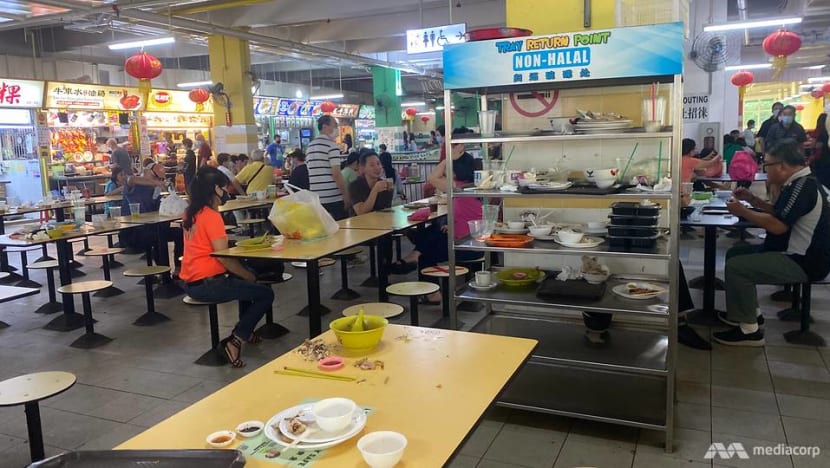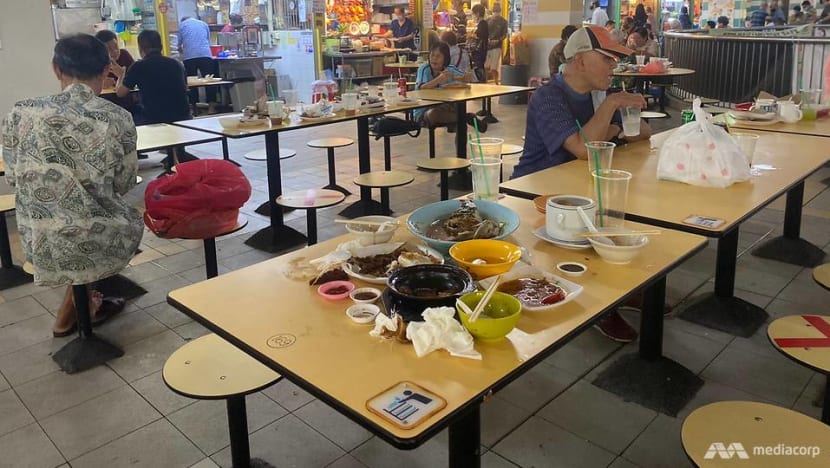Put your tray away: 7 things to know about clearing your table at hawker centres, coffee shops and food courts

Even with tray return stations a few steps away, people still left their trays and utensils on the table. (Photo: Ang Hwee Min)
SINGAPORE: Diners at hawker centres will face fines from Sep 1 if they do not clear dirty trays, crockery and litter from their tables.
Enforcement will also be rolled out to coffee shops and food courts in the fourth quarter of the year, said the National Environment Agency (NEA) on Friday (May 14).
These measures will help Singapore transition to a “more socially conscious, self-service concept”, allowing diners to have their meals in clean and hygienic environments and protect against public health risks, said NEA.
Here are seven things to keep in mind the next time you dine at a hawker centre, coffee shop or food court.
WHAT AM I NOT ALLOWED TO LEAVE ON DINING TABLES?
Diners are not allowed to leave dirty trays, crockery and litter on the table. Examples of litter include used tissues and wet wipes, straws, wrappers, canned drinks and plastic bottles.
Food remnants such as shells and bones are also considered litter. Leaving them on the table will be an offence.
However, diners who put their litter together with their dirty trays and crockery at return stations will not be penalised.
If you have accidentally spilled gravy or a drink on the table, that is not considered litter.
“As much as practicable, diners can help to clean the spilled gravy or drink and keep the table clean,” said NEA, adding that enforcement will take a pragmatic approach.
READ: Change in mindsets, establishing norms needed to get diners to return their trays, say experts
WHAT ARE THE PENALTIES IF I DON’T CLEAR THE TABLE?
Before the fines kick in, there will be an advisory period from June to August for the public to adjust. During this period, enforcement officers will remind diners to clean up after themselves but will not fine them.
From Sep 1, the officers will continue to advise diners to clear their tables. They will go on to take enforcement action if diners do not heed the advice.
If you are a first-time offender, you will get a written warning.
If you are a second-time offender, you get a fine of S$300. This is similar to the amount for other compoundable littering offences, said NEA.
Repeat offenders may face court fines.
DO I HAVE TO CLEAR WHAT’S LEFT BEHIND BY OTHER DINERS?
No. Cleaners will help to clear dirty trays, crockery and litter left behind by previous diners.
But all diners are urged to keep tables clean as this “shows consideration” for the next diner, said NEA.
WHAT IF MY LITTER WAS BLOWN ONTO THE FLOOR?
If you use a tissue and it gets blown onto the floor by a breeze, be sure to pick it up and throw it away.
Allowing litter to be blown onto the floor in a public place and not picking it up is an offence, said NEA.
“No one should leave behind any litter in any public place, except in a dustbin or other receptacle provided for the deposit of refuse and rubbish,” said the agency.
READ: What would make Singaporeans return their trays? How about a siren?
WILL THE ELDERLY, CHILDREN AND PEOPLE WITH DISABILITIES BE PENALISED AS WELL?
The less-abled or “frail elderly” who are unable to clear their tables will not be penalised, said NEA.
People with disabilities will not be penalised either, said the agency, citing its pragmatic approach to enforcement.
As for children under 12, officers will educate them on the importance of leaving a clean table for the next diner.
Dining companions of these groups of people should help them dispose of litter and return dirty trays and crockery.

WILL CLEANERS LOSE THEIR JOBS IF I CLEAR THE TABLE MYSELF?
No. In fact, clearing your own table will allow cleaners to focus on the “most important task” of cleaning and disinfecting tables, said NEA.
“Cleaners will not lose their jobs just because diners clear their trays, as they are still required to maintain and upkeep the general cleanliness of dining places,” said the agency.
This includes wiping and sanitising tables, and clearing and sorting dirty crockery at designated return points.
When diners clear their own tables, this reduces the need for cleaners to make frequent rounds and facilitates faster turnover of tables during peak mealtimes, said NEA.
READ: Leaving behind trays, food debris at hawker centres could expose others to diseases: Health experts
It also means a safer and more sanitary working environment for cleaners.
Public dining places have a tight cleaning workforce that is mostly made up of seniors, who may be more vulnerable to diseases like COVID-19, said NEA.
“There will be benefits to both hawkers and patrons, and redesigning of the cleaning role in consideration of our ageing cleaning workforce," said the agency, adding the average age of cleaners is 60.
WHY IS THE ROLL-OUT LATER FOR COFFEE SHOPS AND FOOD COURTS?
Hawker centres are prioritised for enforcement because they have high footfall and exposure to bird encroachment, said NEA.
But the requirement on clearing tables applies to all public dining places, including hawker centres, coffee shops and food courts.












